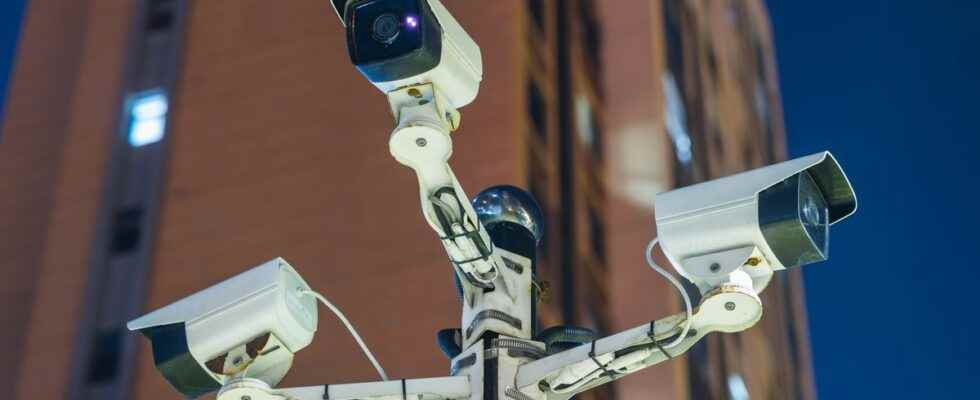Video surveillance © Getty Images
The orientation and programming bill of the Ministry of the Interior (LOPMI) is one of the major subjects of this end of the year for the government. This bill sets the objectives and programs, the human, legal, budgetary and material resources of the Ministry of the Interior for the period from 2023 to 2027. Perceived as the new major security text, it provides in particular for an increase in the budget of 15 billion euros, part of which will be allocated to the overhaul and digital modernization of services as well as the granting of additional resources for law enforcement.
Digital transformation of the ministry
“Digital technology brings new opportunities, but it is also a new field of action that the Ministry of the Interior and Overseas Territories must invest, using cutting-edge human and technological resources”comments the Ministry of the Interior in its press kit. “Faced with cyber risks, with cybercrime increasing by 10 to 20% each year, citizens, businesses and all of our institutions must be made aware and equipped to protect themselves from attacks. The cyber crisis management capacity must also be ramped up.”
Thus, almost half of the means of the law are dedicated to digital transformation. The ministry intends to recruit 400 high-level civil servants and contractors to implement essential digital projects, but also aims to open up to civil society: citizens, businesses, research laboratories and the academic world, associations, etc.
The text also aims to enrich the digital identity of citizens, in the continuity of what has already been done with the deployment of the electronic identity card. The government thus wishes to dematerialize electoral proxies to simplify and make the process more reliable, a subject already mentioned several times by Gérald Darmanin. More vague is the idea, recorded in the LOPMI dossier, of “guarantee for each teleprocedure a means of effective and personalized support, in order to fight against the digital divide, everywhere in the territories”.
Finally, some complaints could in the future be filed by videoconference.
Fight against cybercrime
As we have seen this year in the monitoring of the news, the Covid-19 pandemic has accentuated cyber threats against companies and public services in France. The LOPMI should therefore strengthen the arsenal of the fight against pirates. Already mentioned in our columns, the text aims to create a digital equivalent of 17 as an emergency call. Already nicknamed “17 cyber”, this number will aim to allow every citizen, from the simple individual to the business owner, to report a computer attack and be put in touch with a specialized operator.
Another subject mentioned earlier this year: the training of 1,500 cyber patrollers. These will be assigned both to the gendarmerie or the police and to the intelligence services. The nature of the missions remains unclear, but these additional forces, part of which will be reservists, will support those existing in cases of cyberattacks, cyberstalking, online reporting and other web-related matters. A cyber training school should be created to train all these beautiful people.
On cyberattacks more specifically, the LOPMI wishes to make it possible to seize criminal assets held in the form of crypto-assets (cryptocurrency, NFT, etc.), to make reporting to the authorities of the payment of a ransom compulsory and to make 100% of companies aware of the risks of cybercrime. Some points still need to be clarified, in particular that concerning insurability and the payment of ransoms.
The risk of a technopolice?
The aspect that the defenders of individual freedoms like the least is that of the technological means allocated to the police. The text wishes to equip border police officers with surveillance drones, infrared and thermal cameras or automated license plate reading systems.
To help police and gendarmes, the bill envisages the deployment of drones, in operational support or for the collection of information, but also the installation of pedestrian cameras, cameras on board vehicles, digital terminals and mobile stations. allowing access to all useful resources from the field.
La Quadrature du Net and the Freedom and Digital Observatory (OLN) are particularly hostile to the bill. “A veritable political manifesto, this 85-page report promotes a fantasized and frightening vision of the police profession, where the cyborg agent and technological gadgetization are presented as the ultimate means of doing security”can we read. “Whether it is security delirium or electoral calculation, the report delivers a disturbing vision of digital technology and the notion of security.”
Where is the bill?
On Tuesday, November 22, the bill was passed in the Assembly with 419 votes in favor and 116 against. The government was able to rely on the LR and RN votes to pass its security law. After this vote, deputies and senators must now agree on a common version of the text in a joint committee.
